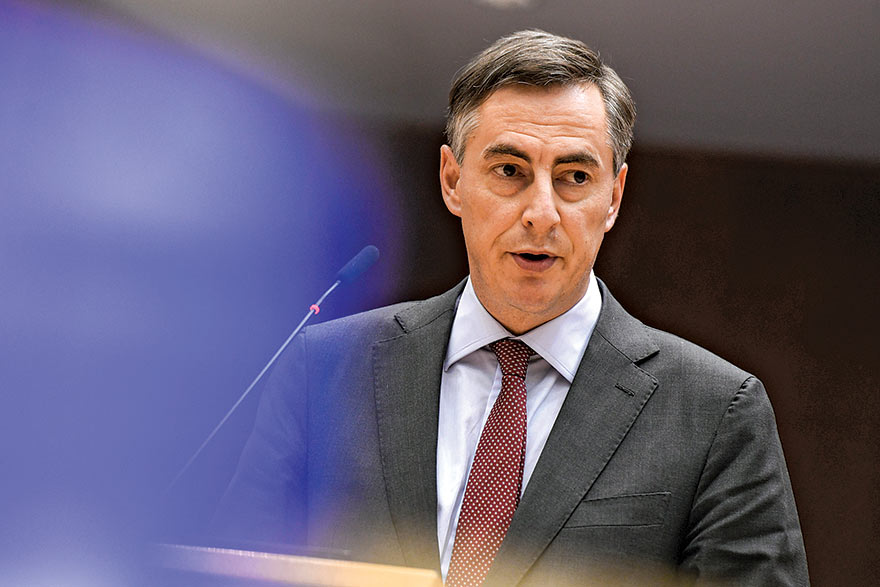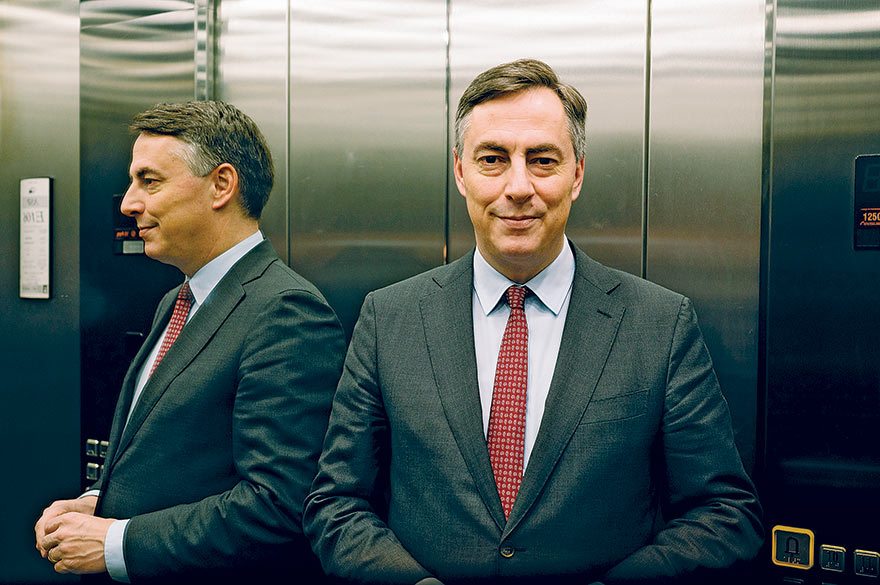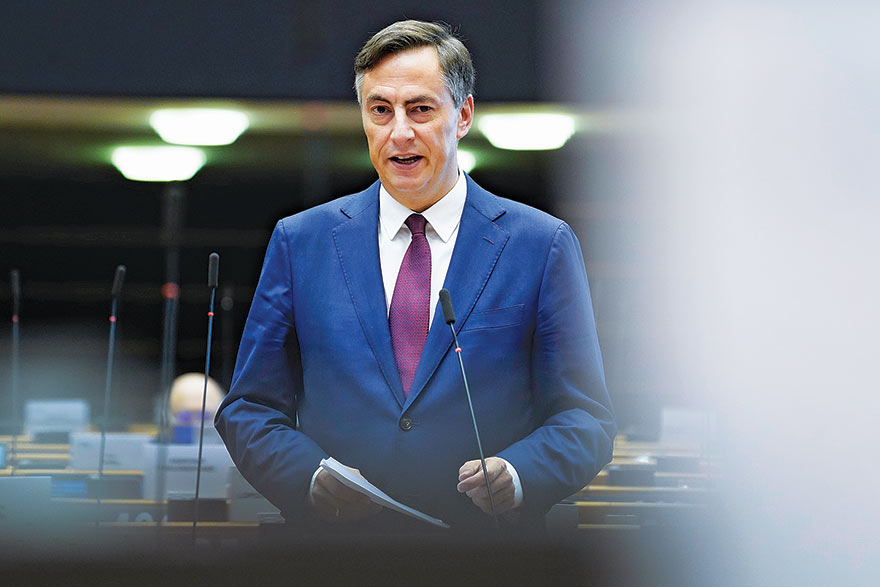The final report of the OSCE/ODIHR on the June 2020 elections gives recommendations on how to improve the overall conditions, including an independent media environment, for all political actors who wish to seek citizens’ support – David McAllister
The discussion between David McAllister, President of the European Parliament’s Committee on Foreign Policy, and Ivica Dačić, Speaker of the National Assembly of Serbia, marked the finalisation of preparations for the so-called second phase of the Inter- Party Dialogue, which, like the first phase, is dedicated to creating the conditions for fair and free elections. The European Parliament delegation mediating this dialogue has retained the same composition, says David McAllister for CorD Magazine. European parliamentarians will face a challenge, perhaps as early as this month, in helping to mediate the first official discussion between representatives of the ruling Serbian Progressive Party and the opposition parties that opted to boycott the June 2020 elections.
The resumption of the political dialogue in Serbia was announced to begin “after the Christmas holidays”. We are now in March, yet neither the format nor the dynamics of the discussions have been defined. How would you respond to the concerns of the opposition that the start of the dialogue is being delayed unnecessarily?
There are ongoing activities on the side of the European Parliament when it comes to the Inter-Party Dialogue. I have been in good contact with the Speaker of the National Assembly, Ivica Dačić, to ensure continued facilitation under the auspices of the National Assembly. The process should start as soon as possible, taking into account the announcement of early parliamentary elections for April 2022. The European Parliament’s facilitation team will be led by current MEPs Vladimir Bilčík and Tanja Fajon. They will be supported in their tasks by former MEPs Eduard Kukan and Knut Fleckenstein.
Given that you initiated the political dialogue that preceded the 2020 parliamentary elections, are there any changes that you would suggest in the latest attempt to agree on fair elections?
During the first phase of the Inter- Party Dialogue, the participants reached a consensus on 17 commitments to improving electoral conditions, which need to be fully implemented by all relevant stakeholders.

The final report on the June 2020 elections by the OSCE Office for Democratic Institutions and Human Rights (ODIHR) gives recommendations on how to improve overall conditions. It is key to create trust in institutions and a level-playing field, including an independent media environment, for all political actors who wish to seek citizens’ support.
A group of MEPs from the ranks of the liberals recently requested that the report on Serbia include assessments by the OSCE/ODIHR mission that the parliamentary elections in Serbia were held with “significant shortcomings”, such as pressure on voters, officials’ campaigns and media bias. What does such a report say about the real scope of the political dialogue that preceded the elections?
The report can only be treated as being final after a vote is held in the plenary of the European Parliament. This text is currently still in the drafting phase. The political groups are carefully working on the specific contents.
The electoral framework needs to be improved. That’s why the European Parliament is ready to continue the Inter-Party Dialogue, which could assist in preparing the reforms
In general, the enlargement reports, including the one on Serbia, should be seen as a set of political messages and guidelines that the European Parliament wants to give, not only to the Serbian authorities, but also to the European Commission and the European Union Member States, in order to accelerate the accession process.
When it comes to the European Parliament’s report on Serbia that the plenum will deal with in March, what would you say about the 600 amendments submitted to the draft by Vladimir Bilcik?
As far as I know, 385 amendments were tabled. Enlargement reports and accession countries are very high on the agenda of the Foreign Affairs Committee. The numerous amendments express a variety of positions of the respective political groups and interested MEPs. They refer to many aspects of Serbia’s relations with the EU, acknowledging the progress already achieved. At the same time, MEPs are also calling for improvements on democracy, the rule of law, fundamental rights, media freedom and the fight against corruption. At this stage, it is hard to predict the outcome, as the negotiations on the compromise text are ongoing.

Do you share the concerns of MEPs regarding the state of democracy and the rule of law in the country, which has been emphasised in a number of amendments to the report on Serbia?
According to the assessment of the European Commission, Serbia obviously still has some work to do on fundamental reforms.
The progress on the rule of law chapters will determine the pace of accession negotiations. The electoral framework needs to be improved. That’s why the European Parliament is ready to continue the Inter-Party Dialogue, which could assist in preparing the reforms.
For the European Union, Mr Biden is a president we can cooperate with better. He stands for trust, reliability and predictability. I am certain that our transatlantic partnership will get a new impetus
Do you think the position of the group of European parliamentarians seeking a formal response to the “hate speech” of Serbian politicians, directed against members of the European Parliament, is well-founded?
Democratic discourse requires the respect of certain rules and standards. This applies to every political discussion. Respect is fundamental for a liberal and pluralistic society.
The key issue in the EU at present is the struggle against COVID-19. How do you see initiatives to introduce “coronavirus certificates” to be used by citizens when travelling inside the EU?
It is understandable that countries which largely depend on tourism are calling for such an initiative. The situation is currently still very serious, especially in the light of the new variations. The EU heads of states have agreed to work on a standardised and inter-operable form as a proof of vaccination for medical purposes. At the moment, we need to concentrate our efforts on providing access to vaccination to as many citizens as possible and as soon as possible.

Given that you’ve been critical of outgoing U.S. President Donald Trump, what changes in relations with the EU do you expect under the presidency of Joe Biden?
For the European Union, Mr Biden is a president we can cooperate with better. He stands for trust, reliability and predictability. I am certain that our transatlantic partnership will get a new impetus. On the multilateral stage, the United States will become more active again. The European Union will get back its traditional partner when it comes to the promoting of a rules-based global order. Also on the bilateral level, there is a lot to repair. It is the right time to define a new agenda for EU-US transatlantic relations in order to tackle common challenges.
I am optimistic that my CDU party and our sister party from Bavaria, the CSU, is well prepared and organised for the coming elections. I look forward to an election campaign with fair conditions. I hope for tough debates on the political content, based on mutual respect and tolerance
How are Germany and your Christian Democratic Union preparing for Angela Merkel’s departure as Chancellor, as an event that has already be given the epithet of ‘historic’?
After almost 16 years, Angela Merkel has declared that she will no longer run the country as chancellor. Indeed, it will be an historic moment and the beginning of a new era. It will be a crucial year for Germany’s political future, with the Federal election on 26th September. In mid-January, my party, the CDU, elected Armin Laschet as the new leader. He is an experienced politician and a convinced European, having been an MEP himself from 1999 until 2005. I’m optimistic that my party and our sister party from Bavaria, the CSU, is well prepared and organised for the coming elections. I look forward to an election campaign with fair conditions. I hope for tough debates on the political content, based on mutual respect and tolerance.
| ENLARGEMENT
Enlargement reports and accession countries are very high on the agenda of the Foreign Affairs Committee | REFORMS
According to the assessment of the European Commission, Serbia obviously still has some work to do on fundamental reforms | NEGOTIATIONS
The progress on the rule of law chapters will determine the pace of accession negotiations |
|---|